Projects 2006-2007
There have been five
independent projects running in 2006: Northern atoll expeditions - three
projects, and a Coral Reef and Sharks exhibit.
1. Parks for Sharks:
Integrating Shark Conservation in the Marshall Islands with national
efforts in coral reef conservation in Ailuk Atoll.
Baseline surveys will
be run at Ailuk atoll, after a special request put forward by the local
population and by MIMRA. Assessments on shark abundance and
distribution will be coupled to the corals, fish, target invertebrates
and seaweeds assessments. Reef sharks have been increasingly fished by
foreign fishing fleets in RMI. Locals and tourist divers have reported
an abrupt decline in once bountiful shark numbers. Sharks were observed
to have declined at Rongelap, Jaluit and Bikini Atolls between the 2002
and 2003. Assessing populations of reef sharks is one of our priorities
in 2006, in order to address a major information gap for sustainable
management. Recommendations for 4 conservations sites were part of the
NRAS final report. The local Ook fishermen council approved all of
them, on top of total ban of shark and Napoleon wrasses fishing.
Project 2 and 3. The
Northern Atoll trip to Rongelap and Rongerik Atolls is scheduled from 8
– 28th June 2006. The Northern Atolls Trip is a combination
of two separately funded projects. 2. funded by the bp-conservation
grant, the resource assessment expedition to Rongerik Atoll aims to do
a baseline survey of rare fishes and corals and overall reef status.
Also, see article: Ailuk focuses on marine resources (1 MB).
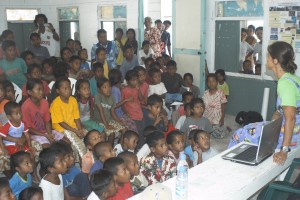
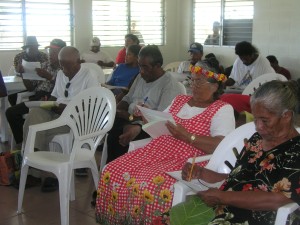
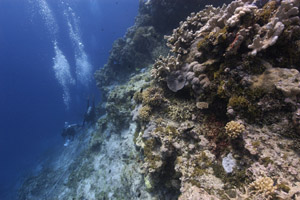
Sponsors:
1. Tacoma
Zoo and Aquarium

2.
Department
of the Interior

3. MIMRA Marshall Islands Marine
Resources Authority
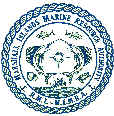
4. The Winifred Violet
Scott Estate
2. Coral reefs and
Sharks: a travelling educational exhibit
This exhibit visited two different atolls in the country (Majuro and Ailuk) and was presented in Marshallese language.
PDF of mangroves poster (4 MB).
PDF of turtles poster (4 MB).
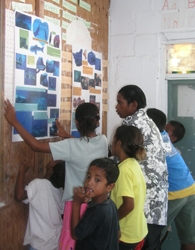
Sponsor:
Tacoma Zoo
and Aquarium

3. Monitoring the effects of human resettlement on the pristine coral reefs at Rongelap Atoll.
Funded by a grant of the NOAA Coral
Reef Conservation Program to the College of the Marshall Islands (CMI),
this project aimed to establish, in partnership with local
people, a long-term monitoring project at Rongelap Island, where most
impacts from human settlement are likely to occur.
The preliminary aims were
1) to compile a baseline dataset of the status of coral reefs at Rongelap Atoll and
2) to train local participants in coral reef survey techniques to facilitate future monitoring efforts.
The monitoring programme was
designed using globally accepted survey techniques that are highly
replicable and suitable for implementation by trained locals.
Rongelap’s reefs have not been subjected to human impacts for the
past 50 years because the human population was evacuated after
radioactive fallout from nearby atomic tests. The baseline monitoring
dataset assembled in this project describes the pristine reefs of
Rongelap Atoll prior to the forthcoming resettlement. Marine reserves
are intended to be established around the atoll, hence survey sites
were established inside and outside reserves to monitor the long-term
effects of humans and the success of reef protection measures.
Participants from both Rongelap Island and the local management agency,
MIMRA, were
actively involved in this project and with the guidance of
international coral reef experts they gained hands on experience in
long-term coral reef monitoring.
Sponsors:
NOAA National Oceanic
and Atmospheric Administration

CMI College
of the Marshall Islands

MIMRA Marshall
Islands Marine Resources Authority

4. Community based
marine conservation actions in the atoll of Ailuk, Marshall Islands:
Also see article in March 2008 SPC Women in Fisheries Information Bulletin: Successful community engagement in resource management efforts on Ailuk Atoll, Republic of the Marshall Islands Silvia Pinca and Frankie Harriss (2008).
Implementation of two
marine sanctuaries through community decision making, capacity
building, vocational training, awareness and education.
This project
contributes to on-going national and community-based
marine conservation efforts and aims to achieve biodiversity
conservation in Ailuk atoll through:
* the establishment of 4 integral conservation sites
* the institution of
an educational, awareness and information centre
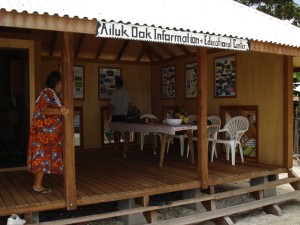
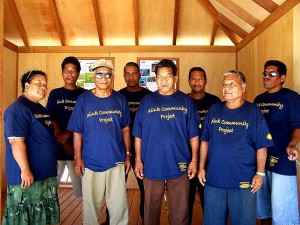
* training in coral
farming and transplantation for enhancement of
coral population in the lagoon and for export of commercially
interesting fragments
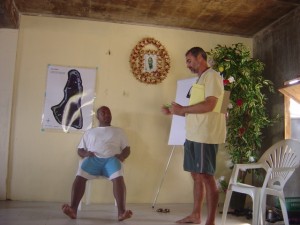
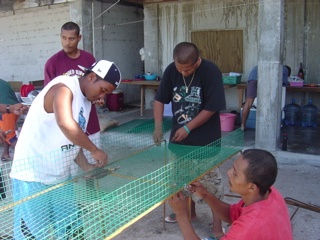
* a mangrove
biodiversity survey and population study
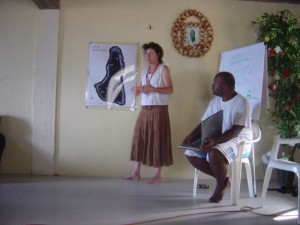
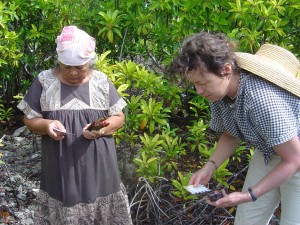
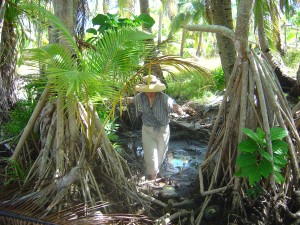
PDF of Report Ellison 2007 (1 MB).
* a shoreline erosion
mitigation action through re-plantation of
mangroves
* workshops on
mangrove monitoring for environmental changes
Sponsors:
Regional
Natural Heritage Programme (RNHP)
MIMRA Marshall Islands
Marine Resources Authority

5. Ailuk - Seacology
Ailuk Atoll community obtained a $32,500 grant to upgrade their airport terminal: Ailuk Seacology Article (800 kB).
In return of creating two conservation sites, the grant was donated by California-based NGO Seacology,
which offers support for the protection of island environments and
cultures throughout the world, with several projects currently running
in other Micronesian islands.
After the research conducted in 2006, NRAS has been coordinating with the Ailuk Ook Fisheries Committee and the Marshall Islands Marine Resources Authority (MIMRA) over the past year to develop the fisheries management plan.
Five conservation sites were chosen based on traditional knowledge and
the results of underwater surveys conducted by NRAS in May and June,
2006. Two if these sites chosen for conservation by the fisheries
committee and the local government are Eneja (Enije Island), a known
turtle nesting area, and To-eje (Enije channel), which is abundant
withmega-fauna. The sites involve 215 acres, which will be conserved
for 10 years in exchange for the $32,500. The airport terminal was a
skeleton of a building and it was then rebuilt thanks to this last
grant, in perfect timing with the deadline of this project. This was
earmarked by Seacology as one of the few successes achieving the goals
as foreseen in the proposal. Their excitement with the accomplishment
is stimulating this NGO to deliver more grants to the community!
Please see our publications
page for project reports.
Back to Projects
|











